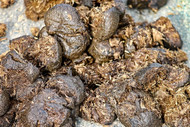You shovel it every day, but have you ever taken a close look at your horse poop? The manure put out by your beloved equine friends is more than just a chore to be dealt with … it can be a useful diagnostic tool to guide you to how to maintain his/her health and welfare.
An average horse defecates about 8 times a day, producing around 50 lbs (22.6kgs) of manure. It can take anywhere between 36 and 72 hours for a mouthful of food to be turned into horse poop in the equine digestive system. Every pile of poop is important for monitoring your horse’s health status. Take a closer look:
The Perfect Horse Poop
Every horse is different of course, so there may well be variations in the “normal” colour and consistency of your horse’s manure. It’s when there is a sudden and wide variation from the norm that you should worry.
In general, though, a healthy horse poop is roughly spherical in shape (hence often referred to as “horse apples”), greenish-brown in colour (roughly correlating to the colour of his diet of hay/grass), and moist (but not wet).
Horse Poop Colour Variations
Generally, horse manure is a green shade, but the colour is dependent on what the animal is eating. If your horse is on alfalfa or grass, his poop will be bright green; dry hay will produce brown manure. If you feed beet you’ll get poop with a reddish tinge. The only time to worry about colour is when the manure obviously contains blood, or is slimy and grey, coated with yellowish mucous.
When you notice aberrations in horse poop colour that vary from what is normal for your horse, take note, and monitor the situation. If concerned call the vet to be on the safe side because there could be a problem in his gut, such as feed impaction.
Horse Poop Consistency Concerns
A perfect pile of horse poop will have well formed balls, moist but not wet. After hard work, in hot weather or when he’s nervous his manure might be softer, but if the soft consistency continues in normal conditions it could indicate a gastric problem.
If your horse has very liquid diarrhea call the vet straight away and isolate the horse from others. It could be down to a transmittable viral or bacterial infection or an inflammatory condition.
At the other end of the scale you may notice your horse poop is hard and dry – a sign of dehydration which could bring on impaction colic. Increase his water consumption however you can with ploys like soaking hay or feeding a bran mash. If this doesn’t help, once again its wise to get a veterinary opinion.
Worms in Horse Poop
There are five different types of parasitic worms that can infest the equine gut in the UK – small and large redworms, tapeworms, roundworms and bots.
It’s rare to spot these when they’re excreted in the dung, particularly the eggs which are microscopically small, but it is not unknown to see live worms themselves wriggling in your horse poop. This is indicative of a heavy parasitic infestation, which should be investigated and treated straight away with an appropriate de-wormer. If you have recently dewormed your horse and then notice that he’s excreting dead worms, that’s perfectly normal.
Regular treatment and monitoring of worm infestation is essential for horses.
Their health can be severely compromised by hosting internal parasites that can damage the intestines and other organs, leading to poor body condition, colic, general ill health and even be potentially fatal.
Don’t leave things to chance – make sure your horse is de-wormed regularly.
The Importance of Poo-Picking
No-one enjoys poo-picking and mucking out, but it IS essential. It’s the most effective way of reducing the worm burden, and of course keep your pasture looking good and growing healthily. It also allows you valuable time to commune with your horses!
Now that we’ve explained how your horse poop can tell you all sorts of things about the health of your horse, we’re sure you’ll agree poo-picking gives you the perfect opportunity to ruminate on the colour, consistency and quality of the poop you’re scooping.
So next time you’re out there in the cold, or sweating in the heat, with your poop scoop or shovel do it with a smile and a spring in your step. Good job!



